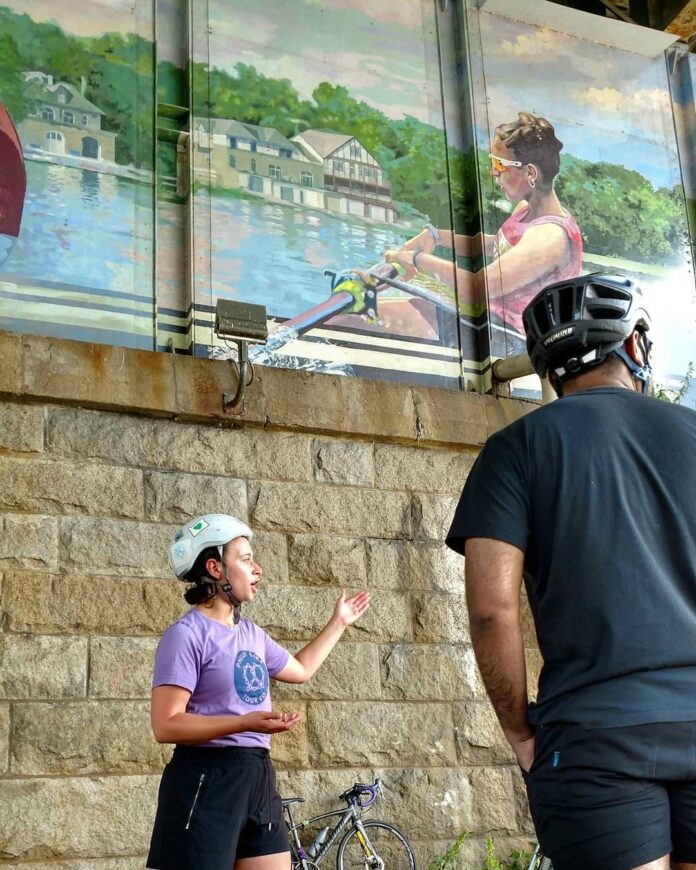“We’re cultivating admiration for those who aren’t typically admired,” said Rebecca Fisher, one of the founders of Beyond the Bell tours, which specializes in tours and field trips that focus on less visible aspects of the city’s history.
Beyond the Bell typically hosts walking tours, but Fisher aims to offer at least one new way of experiencing a tour every summer. She’s offered trolley tours and tours that centered women-owned bars in the past. This year, she’s trying something different — a weekend of queer history bike tours on July 13 and July 14.
“I thought it’d be really cool to do more queer history outside of the Gayborhood,” said Fisher. “We’re limited to walking geographically about a mile to a mile and a half on walking tours, but bikes can really cover a lot more territory.”
Shelly S. Walker, one of the owners of Fairmount Bike Shop and Philly Bike Tours — which is partnering with Fisher for this upcoming opportunity — noted that people often think of trolley tours when they want to see more of the city than they can on foot. But trolley tours operate at a much faster pace which can limit how much people truly experience the city as they pass historic sites.
“This is the best of both worlds,” Walker underlined about traveling by bike.
The upcoming tour will begin at Fairmount Bike Shop and last approximately three hours. It will cover about seven to eight miles across three to four neighborhoods with multiple stops at noteworthy locations.
Those who take the tour are welcome to bring their own bike, but it’s not required. The cost of a bike rental is included in the ticket price. The rides, which can only accommodate up to 12 people per trip for safety reasons, are expected to fill up quickly.
For people who feel less confident about biking in the city, Fisher explained that going in a cohort is a good way to give cycling a try. The tour will stick to designated bike lanes, and traveling in a group tends to be safer than exploring independently. A “sweep” will also ride at the back of the pack to ensure no one gets lost or left behind.
Walking and bike tours can be a good way to meet new friends, said Fisher who noted that the opportunities to stop and talk about what people are learning along the route allow people to make new connections.
Fisher said people often thank her for introducing them to new understandings of Philadelphia and the city’s LGBTQ+ history. One of Walker’s favorite lesser-known artifacts of Philly’s hidden past is a street sign that still exists on Delancey Street — a curfew sign that originated because of the queer cruising scene in the neighborhood.
“Everybody kind of has to see it as they pass it, and they probably don’t know the history of it,” she said.
Walker said it’s important to reflect on the people of Philadelphia’s history that have paved the way for people like her to “not have to think too hard” about their queer identities — that they don’t have to contemplate keeping their identities a secret and also don’t feel forced to make their LGBTQ+ experiences a focal point of their public-facing lives.
Fisher also acknowledged this kind of progress, expressing excitement about the clear change in some school systems, libraries, and bookstores to include stories about LGBTQ+ people that feel more normalized and positive. This contrasts the media that was available when she was growing up, which solely depicted stressful coming out experiences or narratives of struggle and hardship.
But Fisher, who also works as a long-term substitute teacher, still has to intentionally incorporate LGBTQ+ and women’s history units into her classrooms because they’re otherwise left out.
“We’re talking about our heroes,” Fisher said about the need to introduce people to the history of LGBTQ+ advocacy work that advanced causes for the queer community.
“This is where our conversations about American freedom and democracy started — and of course, all of the ways in which that project has failed to live up to its ideals and those conversations about evolving liberty are also happening in Philadelphia and have always been happening here,” she noted. “It makes exact sense that we have these queer stories here too.”
Queer History Bike Tour will be held 1-4 p.m. on July 13 and July 14, beginning at at Fairmount Bike Shop, 2015 Fairmount Ave. For more information, visit phillybiketours.com/queer.

